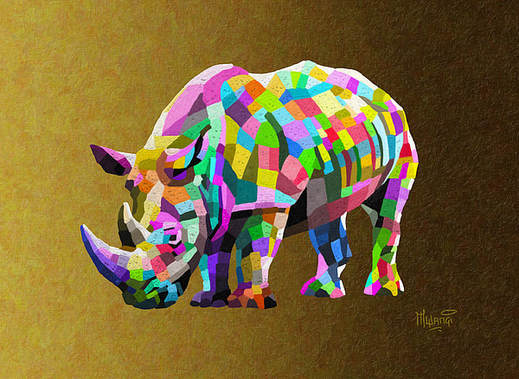 "Wild Rainbow" Painting by Anthony Mwangi
"Wild Rainbow" Painting by Anthony Mwangi It appears that Balala is way out of his depth in handling this issue. But focus on his sacking still misses the crux of the debate.
This latest clash is driven by the conservation world’s push for a policy on “consumptive wildlife.” Conservationists claim to speak in defence of pastoralist communities, saying that they policy would help them earn money, as opposed to now when communities are losing their crops and livestock to the same wildlife.
That argument is persuasive, but the devil is in the details.
The rich conservancies are not being open about their interests. Many of them own millions of acres of land which they did not buy. They are making money off our resources for free. The only way they can continue fleecing this country is by claiming to fight for wildlife, but to be more credible, they co-opt the local conservancies. But local conservancies do not have the same networks to global capital or decision making bodies like KWS. Foreign and white-owned conservancies are more equal than the local ones.
Conservancies are also supported by rich foreigners who get a literally pornographic satisfaction from killing of animals for sport.
But the question facing Kenyans is not WHO makes money from wildlife, but IF we should make money from wildlife. In my view, the answer is NO. The biggest mistake we have made since independence is to value wildlife only for tourism by foreigners, and now foreigners have used our obsession with their satisfaction to fool us.
Wildlife are not like a rental home or a restaurant. We build homes, but God creates wildlife. We must therefore preserve wildlife because wildlife are members of this Mother Earth in which we live.
Our ancestors taught us morals and lessons through folk tales and riddles with wildlife, because instinctively and philosophically, we needed to be aware that the world is larger than human beings. When we teach children using stories and proverbs about animals, we are teaching them to imagine, to go beyond their immediate environment. Without imagination, children grow into adults who cannot think abstractly or think beyond getting immediate satisfaction.
Wildlife is priceless. So we need to preserve wildlife for its own value, and deal with monetizing it as SEPARATE from conservation.
By separating revenue and conservation, we would understand that there is no human-wildlife conflict. What we have is a human-human conflict, between two classes, and which, unfortunately, also translates into between two races.
The mostly foreign conservancies, tourist hotels and city-based tour agents have access to huge amounts of land, protection from our forces, marketing subsidized from Brand Kenya and access to global philanthropy or capital, while local people cannot sell their crops or livestock or take their children to school.
To resolve this social conflict, we need to enforce zoning laws and regulate land use. We need to open up our economy so that pastoralists can make money from livestock, farmers from crops, and local communities from cultural events and accommodation. We need KWS to be fully funded by the people of Kenya under the ministry of Environment, so that it is accountable only to the people of Kenya.
But most of all, we must remember the lessons of our ancestors. The world belongs to all of us, including the plants and animals who do not speak our language, but who teach us profound lessons about our humanity. Only then will the death of the 11 rhinos not be in vain.
 RSS Feed
RSS Feed
